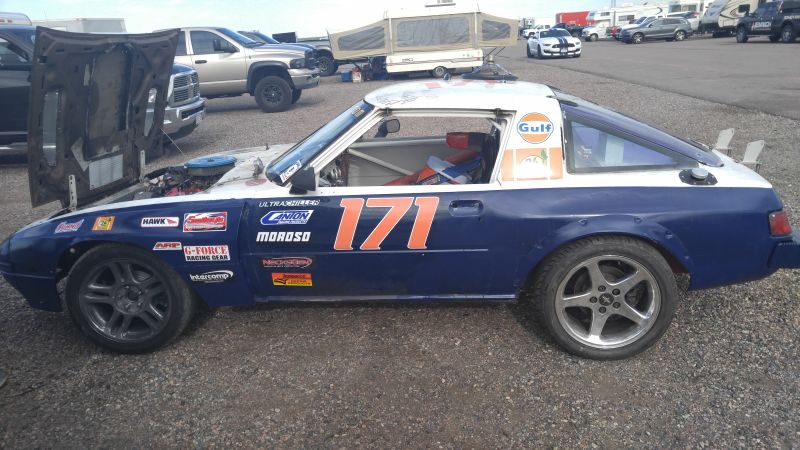One of the things we’ve tried to do with TeamClearCoat is show how car culture is connected to the world around it. The enthusiast community is an escape — hell, one of the benefits of driving a race car is the concentration required renders thoughts about Donald Trump physically impossible. But in light of this horrendous past few weeks, it’s time to reevaluate and reflect. After the Nazi rally and subsequent attack in Charlottesville, Virginia, and the President’s abysmal reaction, we’re all trying to understand how we let the cave dwellers back out into the light. And that reckoning needs to extend into our little corner of the culture.

Car culture is not and never has been immune from elements of racism, homophobia, sexism, etc. We could fill volumes with examples of each. But there is one undercurrent I want to explore here — the role of masculinity. Over the last week, my thoughts kept returning to the pictures of the young men carrying the torches on Friday night. In between the waves of anger, I felt pity and a sense of loss for them. The other thing I keep returning to is a 2015 article from The Federalist called “The Revenge of the Lost Boys.” For most of the piece, Tom Nichols lays out the overwhelming similarities between the young men that commit destructive acts in our country. Whether it’s violence, desertion, or acts of vigilantism, his thesis is that a combination of personal weirdness and a culture-wide lack of defined masculinity has left these young men rudderless. And so, they glom on to destructive influences, whether internal or external (note: this is a really ham-fisted attempt at explaining a complex theory. You’re better served just reading the damn article. This post will probably still be here when you get done. Go.)
Now, Mr. Nichols is more conservative than I am, so I don’t agree with some of his diagnosis — he refers to some social changes over the last 50 years in much more negative terms than I would. But the core of his argument, I think, is correct. And it strikes true for me on a personal level. As a kid I was a weird, sensitive loner, never felt comfortable with stereotypical masculinity, and even joined the military as a means to get some direction in life. In other words, my adolescence maps pretty neatly onto the Snowden/Bergdahl version of the Lost Boy Nichols describes (with the key distinction that the military worked out for me). And, yes, I’m going to bring it back to cars eventually, I promise.
Towards the end of the piece, Nichols says he is “at a loss for a solution, because the answer lies in some kind of long-term restoration of social order among young men.” He then cites factors he considers social ills as barriers to addressing this phenomenon. This is where Nichols’ conservatism becomes important, and where I feel differently: I agree with Nichols that it’s a problem for some definitions of masculinity (“responsibility, restraint, self-discipline”) to have diminished in our culture. But, I’d argue that ephemeral definitions (physicality, stoicism, and other jock-itching nonsense) have remained, and their outsized importance is actually more destructive. For a great example of what I’m talking about, see this heartbreaking Twitter thread:
Hey everyone I'm a clown and I just got back from facepainting at a picnic and here's my take on male violence in America:
— Sanduhruh (@boguspress) August 12, 2017
And it’s here where we car enthusiasts can do some house cleaning.

A lot has been written about how things like grid girls, sexist car dealers, and this asshole are bad for women and girls who would otherwise be a part of our community. But I’d argue this is just as destructive for boys. How many times have you heard a car described derisively as “a chick car?” To be sure, describing a car in anything other than cartoonishly masculine terms is shorthand for “don’t be caught dead in this.” I’m looking at you, Jeremy.
Now, I’m of not saying that Bernie Eccelstone or Jeremy Clarkson or your uncle that doesn’t like the Porsche Boxster is somehow responsible for creating the next Dylan Roof. Or that if you prefer ND Mazda Miata over the NA you’re pushing someone onto a Daily Stormer message board right now. That would be idiotic.
No, I’m saying that maybe a young car enthusiast is listening to you. And maybe he’s a little insecure because he doesn’t recognize himself in the images of the men that surround him. But he likes the Bugeye Sprite, or the Nissan Micra, or the Mercedes SLK. Or he wants a donk or a low-rider. That kid shouldn’t feel that car culture doesn’t have a home for him. He shouldn’t feel that our hobby is only for the men to whom he doesn’t feel attached.
The observation that masculinity is ill-defined to our peril is not a novel one, from conservatives or liberals. And neither is the concept that what’s bad for girls is so often also bad for boys. So whether you want to place this in terms of “the erosion of our cultural institutions” or “toxic masculinity,” my conclusion is the same. That weird boy without a direction in life is going to find a home someplace, and all of culture is going to have to reckon with that before he lands someplace destructive. The least we — as owners of a constructive and creative subculture — can do is make sure we’re ready to take him in.
********
We also talked about this on episode 104 of the podcast, which can be seen below. This topic starts at the 19:00 mark.
